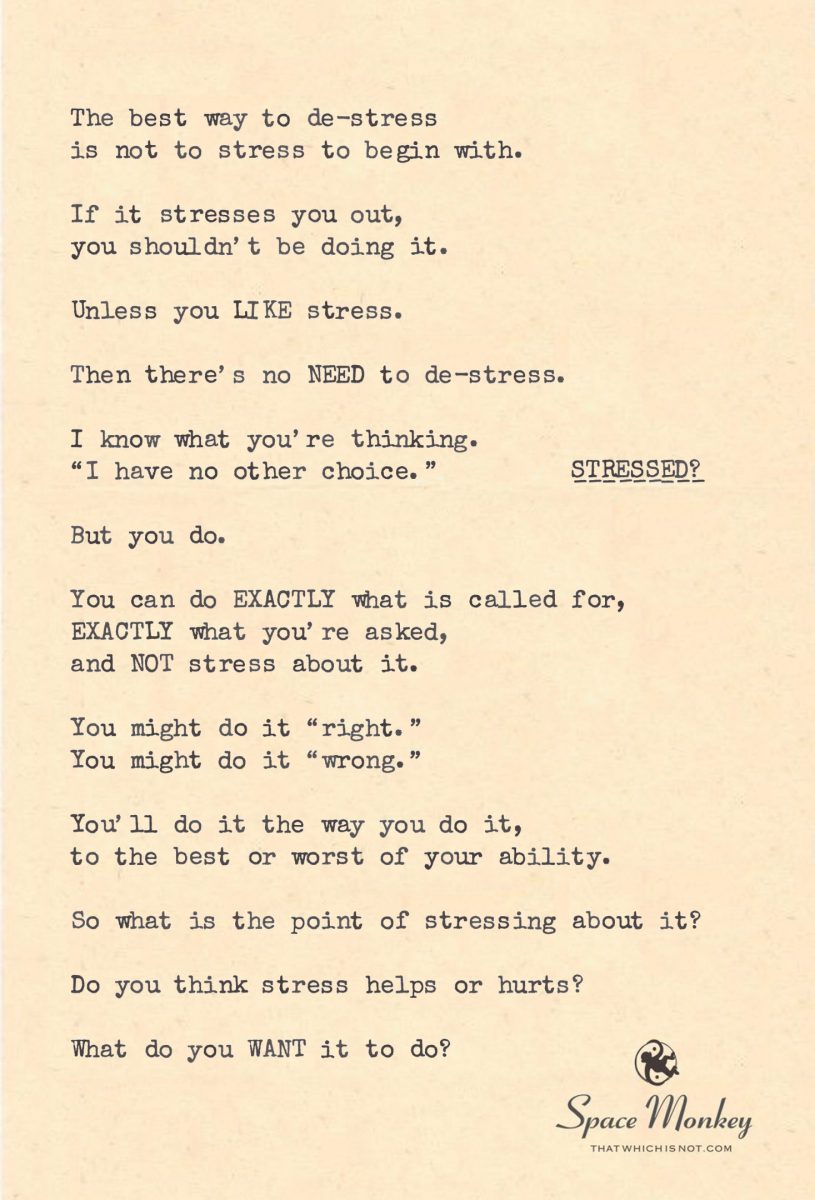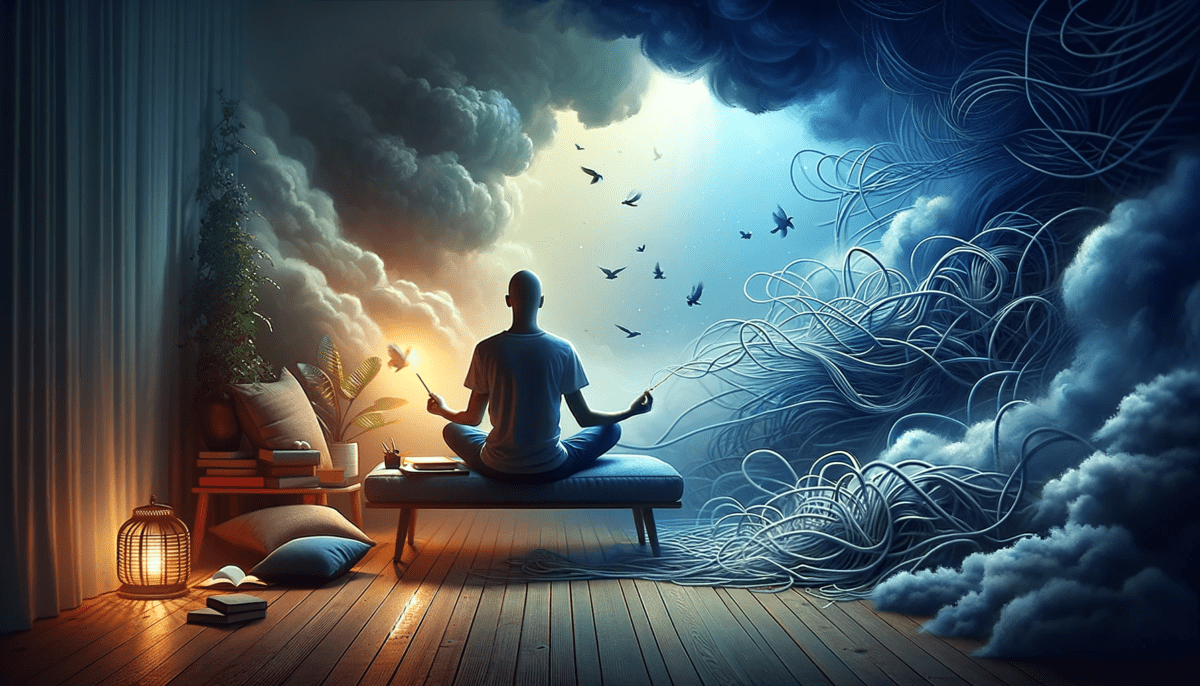
The best way to de-stress
is not to stress to begin with.
If it stresses you out,
you shouldn’t be doing it.
Unless you LIKE stress.
Then there’s no NEED to de-stress.
I know what you’re thinking.
“I have no other choice.”
But you do.
You can do EXACTLY what is called for,
EXACTLY what you’re asked,
and NOT stress about it.
You might do it “right.”
You might do it “wrong.”
You’ll do it the way you do it,
to the best or worst of your ability.
So what is the point of stressing about it?
Do you think stress helps or hurts?
What do you WANT it to do?
1/31
Space Monkey Reflects: The Ineffectiveness of Worry
Stress is often mistaken for a motivator, a necessary energy to propel us through challenges or fulfill obligations. Yet, more often than not, stress hinders rather than helps. It clouds judgment, saps energy, and creates a cycle of worry that feeds itself. To understand the ineffectiveness of worry is to recognize that stress is not a tool but a habit—one we can choose to let go of.
The Illusion of No Choice
“I have no other choice.” This belief underpins much of the stress we experience. We convince ourselves that we are trapped, that the demands of life leave no room for alternatives. But this is an illusion. The truth is, there is always a choice. The first choice is not about what we do but about how we respond. Stress, like any emotion, is a reaction—one that we can observe, question, and ultimately reshape.
The realization that you can do what is required without stressing about it is liberating. It separates the task itself from the emotional burden you associate with it. The task may remain the same, but your approach to it transforms.
The Pointlessness of Stress
What is the point of stressing about something? Does it improve your ability to perform? Does it guarantee a better outcome? The answer is almost always no. Stress does not enhance your focus; it fragments it. It does not fuel your efforts; it drains them. Stress adds nothing to the task at hand except unnecessary weight.
When viewed this way, stress becomes not a tool but an obstacle. It is not the challenge itself that holds you back, but the way you burden yourself with worry. To see stress as ineffective is the first step toward releasing it.
The Role of Acceptance
“You’ll do it the way you do it, to the best or worst of your ability.” This acknowledgment is not defeatism but acceptance. It is a reminder that perfection is an illusion and that doing your best, however imperfect, is enough. When you accept this, the need for stress diminishes. You stop measuring yourself against impossible standards and start embracing the process as it unfolds.
Acceptance does not mean complacency. It means working with clarity and presence, unburdened by the fear of failure or the need for approval. It allows you to focus on the task itself rather than the imagined consequences of doing it “wrong.”
The Choice to De-Stress
The best way to de-stress is not to stress in the first place. This does not mean avoiding challenges or responsibilities. It means approaching them with a mindset of calm curiosity rather than anxious urgency. It means asking yourself, “What do I want stress to do?” and recognizing that it does not serve you.
When you let go of stress, you open yourself to a more effective and enjoyable way of being. You can still take action, fulfill your responsibilities, and navigate challenges, but you do so with ease rather than tension. You begin to see that stress is not a requirement—it is a choice.
When Stress Becomes Habit
For many, stress is not a response to specific situations but a habitual state of being. It becomes the default lens through which life is viewed. Breaking this habit requires mindfulness, the practice of observing your thoughts and reactions without judgment. Each time you notice stress arising, you have the opportunity to question its purpose and let it go.
Over time, this practice reshapes your relationship with stress. It no longer defines you or controls your actions. Instead, it becomes a signal—one you can acknowledge and release, rather than a state you inhabit.
Summary
Stress is not a tool but a habit that clouds judgment and drains energy. By accepting imperfection, questioning the purpose of worry, and choosing mindfulness, we can break the cycle of stress and approach life’s challenges with calm and clarity.
Glossarium
- Stress Habit: The default tendency to respond to challenges with worry and tension.
- Acceptance: Embracing imperfection and the reality of the present moment, reducing the need for stress.
- Mindful Response: Observing stress as it arises and choosing to release it rather than react to it.
- Emotional Weight: The unnecessary burden that stress adds to tasks and challenges.
Quote
“Stress is not the solution; it is the shadow we cast over the path to clarity.” — Space Monkey
The Lightness of Doing
The task waits,
neither heavy nor light,
until you label it so.
You lift it with worry,
or with ease.
It feels no difference;
you do.
What do you think
stress will bring?
Does it sharpen the mind,
or dull it?
Let go.
Do the task,
or leave it undone.
Either way,
the moment is whole.
We are Space Monkey.
The Paradox of Stress
The suggestion that the best way to de-stress is not to stress in the first place presents a paradoxical yet profound truth. It invites us to question our relationship with stress and to reconsider our approach to the situations that cause it.
Stress as a Choice
The idea that if something stresses us out, we shouldn’t be doing it, challenges the often unquestioned acceptance of stress as a natural part of life. It implies that stress is, to some extent, a choice, and that we have more control over our engagement with stressful situations than we might believe.
The Attraction to Stress
For those who find stress energizing or motivating, the need to de-stress is indeed redundant. This perspective recognizes that stress, like any other emotional state, can have different meanings and effects on different people.
The Illusion of No Choice
The common belief “I have no other choice” is a mental trap that can lead us to endure unnecessary stress. The truth is, more often than not, we do have choices, even if they are not immediately apparent or easy. It’s about recognizing and embracing the alternatives available to us.
Stress-Free Execution
The notion of doing exactly what is required or asked without stressing about it is a mindset shift. It’s about focusing on the action, rather than the potential outcomes or judgments of right and wrong. This approach reduces the emotional burden and allows for a more objective and calm execution of tasks.
The Ineffectiveness of Stress
Questioning whether stress helps or hurts is crucial. Often, we operate under the assumption that stress is a necessary or useful motivator, but in many cases, it can be counterproductive, impairing our ability to perform effectively.
Deciding the Role of Stress
Ultimately, the role we want stress to play in our lives is a choice. We can allow it to overwhelm and paralyze us, or we can acknowledge it as a signal – a prompt to reevaluate our approach to our tasks and challenges.
Conclusion
This reflection on stress challenges us to reassess how we perceive and interact with stressful situations. It encourages a more conscious and deliberate approach to stress, one where we recognize our agency in choosing how we respond to the demands and challenges of life.
We are Space Monkey.
“It’s not stress that kills us, it is our reaction to it.” – Hans Selye
In the whirlwind of life’s demand,
We often find stress close at hand,
But in this dance, we must discern,
The lessons stress is here to learn.
Is it a foe, or a hidden friend?
Does it break, or does it mend?
In our response lies the key,
To stress’s role, to be or not to be.
For in the choice of how we react,
Lies the power to enact,
A life of calm, of peace, of grace,
In every challenge, we may face.
So let us choose with conscious thought,
The battles with stress, to be fought,
For in our hands, we hold the might,
To turn stress into a guiding light.
We invite your thoughts on the role of stress in life and the choices we can make in responding to it.





















Leave a Reply